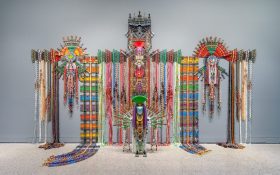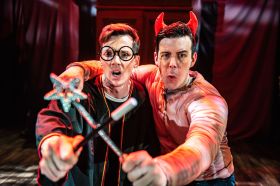I saw Anne Edmonds do a good comedy show on Saturday. It wasn’t perfect but then comedy isn’t. I went with a bunch of friends. We laughed at the good bits, forgave the fluffed lines and then headed off for supper ready for the standard wasn’t-it-funny-when conversation that is my favourite part of comedy.
Except she had ruined it. Edmonds, painfully aware of a number of bloopers, ended her show by apologising to the audience. Instead of going out on warm and sincere applause, she paused, shielded her eyes from the lights and told the audience. ‘I’m sorry. I’ve had one of those days when I’ve been crying all day.’ We might think comedians are thick-skinned, she told us, but she isn’t. ‘I’ve just been bursting into tears all day,’ she said again, tearing up as her audience shifted uncomfortably in their seats.
It’s not hard to imagine why Edmonds felt under pressure or was disappointed in her own performance. It was the opening night of her Melbourne Comedy Festival show The Quarter Cabbage, her first foray into character after successful stand-up. She’d already made a few gags about the number of reviewers in the audience and the fierceness of the competition was obvious as crowds queued and milled in the corridors of the Melbourne Town Hall, being variously directed to the ‘lunch room’ or ‘supper room’ (usually the wrong one) by t-shirted flunkies who were clearly a bit hazy on the geography of the place themselves.
Edmonds had a good share of the crowd – the 50 odd-seats in the room were all filled – but on opening night of a new show the odd slip was not unexpected. She lost her thread a couple of times and slipped out of character into a meandering piece of stand-up when it was clear her banjo needed tuning.
But the audience was with her and most of the show was just fine. The Quarter Cabbage gave us four loosely-linked but sharply created characters including the hilarious Justice, a defensive-aggressive new-age type. Those of us blessed with ageing parents who own computers were s tickled to bits by the segment when an elderly man calls Telstra to ‘send him a tram tracker’. (What do you mean I need a phone? I’ve got a phone. I’m talking to you on it).
We would have spent supper talking about these moments of triumph and forgetting the bloopers if it were not for the apology. Instead most of our conversation was focused on whether she should have said sorry. None of us felt she had anything much to be sorry for. We’d all seen worse comedy. (I’d seen some two days earlier at Felix Bar on Opening Night).
Some of the audience felt sorry for her and figured she was getting her disappointment off her chest. But others were irritated by the disruption to their viewing pleasure and felt imposed upon by the implicit demand that we sympathise with her as a human being doing a difficult job.
The contract between a performer and an audience says the performer does his or her thing and the audience responds to the performance on its merits. Unless you are watching a school play, you don’t suspend your judgement because of your sympathy for the performer.
In ‘fessing up her nerves and sense of failure, Edmonds was asking a comedy audience to meet her own psychological needs and that’s not part of the deal. Comedy isn’t confession and if we wanted Oprah we would have stayed home and watched TV. Justified or not (and I don’t think it was) Edmonds’ apparent feeling that she had stuffed up was something she needed to deal with off-stage. Handing it to the audience was self-indulgent and misplaced.
As our supper conversation meandered from the virtues of banana sorbet to the show’s best lines we kept coming back to that uncomfortable apology. It was the take-away moment from a night of comedy, hijacking the show and the evening. It shouldn’t have been.





